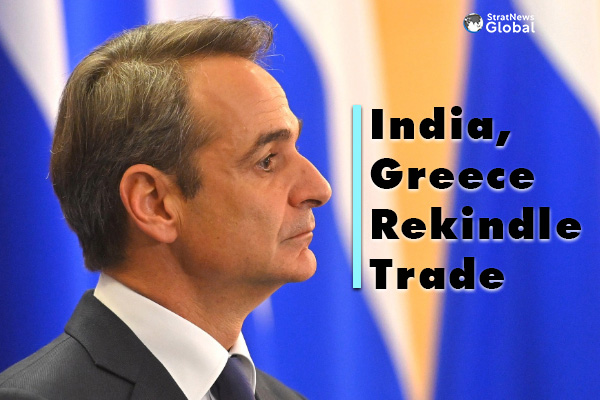“Modi: The visit by Mitsotakis is an amazing opportunity for Greece and India.” So ran the headline of the Greece City Times, an online portal covering news, lifestyle, technology and everything in between.
The prime minister could not be accused of exaggeration: bilateral trade is less than $2 billion so doubling or even trebling that by 2030 may not be too difficult; the Greek economy is not the strongest in Europe although it appears to have recovered well from the Covid crisis; Greece lacks strategic heft although its location overlooking the Mediterranean hints at various possibilities; also it’s been 16 years since a Greek prime minister visited India.
So clearly, there are opportunities, which accounts for Modi rolling out the red carpet for his Greek counterpart Kyriakos Mitsotakis on Wednesday. He was given all the honours of a head of state with a ceremonial reception at Rashtrapati Bhavan. He was also the chief guest at the Raisina Dialogue, delivering the keynote address.
In pics | PM @narendramodi welcomes Greece PM @kmitsotakis at the forecourt of Rashtrapati Bhavan. pic.twitter.com/jfld0GEXBd
— StratNewsGlobal (@StratNewsGlobal) February 21, 2024
Now let’s look at the opportunities. A Migration and Mobility Agreement will open the doors for Indians seeking education and jobs. But Modi’s remarks at a joint press briefing underlined something else.
“With the formation of a Working Group … we will be able to increase mutual coordination on common challenges like defence, cyber security, counter terrorism and maritime security. New opportunities for co-production and co-development are being created in defence manufacturing in India … we have agreed to link the defence industries of both countries.”
Greek defence industry was largely state owned and delivering poorly before it was privatized a few years ago. Today, Greece is largely self-sufficient in key weapons and platforms and has some interesting technology tie-ups, with France, for instance, for building frigates and submarines. Other technology ties up cover the US and even Israel.
This expertise holds interesting possibilities for India, and the Working Group is expected to find out where the two sides could cooperate. An Indian diplomat with long experience of Europe, pointed out that from a strategic point of view, the IMEC (India Middle East Europe Economic Corridor) terminates at Greece; Greece has a defence accord with the UAE that includes a mutual defence clause; it is also reported to have a Patriot air defence battery in Saudi Arabia.
“This meshes well with India’s own growing engagement with the region, whether in terms of IMEC, the I2U2 (India Israel UAE US), the India UAE Comprehensive Economic Partnership and so on,” he told Stratnewsglobal. The engagement with Greece also helps India counter the Turkey-Azerbaijan-Pakistan connection with its rhetoric on Kashmir. India is already supplying artillery and other weapons to Armenia to help it counter an aggressive Azerbaijan. The Greek connection is a warning to Ankara that India has cards of its own to play (add to that recent outreaches to Egypt and Italy).
Greece is also showing a growing disconnect with China. Once a big investor in Greece, including a majority stake in Piraeus port, Beijing has since been on the backfoot in recent times. Mitsotakis was instrumental in kicking out Huawei from his country’s 5G network. He also refused to host a summit of China and the countries of Central and Eastern Europe.
As Mitsotakis noted, “Both share a certain ethos or Dharm as you call it.. we share a strong commitment to international law including the UN Convention on the Laws of the Seas … and crucially the world’s oldest democracy and the world’s largest share the mutual political will to cooperate.”
Thirty eight years in journalism, widely travelled, history buff with a preference for Old Monk Rum. Current interest/focus spans China, Technology and Trade. Recent reads: Steven Colls Directorate S and Alexander Frater's Chasing the Monsoon. Netflix/Prime video junkie. Loves animal videos on Facebook. Reluctant tweeter.





